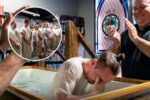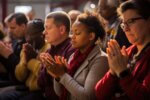Recently I read a quote that inspired me, “Aspire to inspire before you expire.” After all, shouldn’t that be the goal of every Christian—to use the limited time we have on this earth to inspire others. But before we can truly inspire others, we must be inspired ourselves.
The word “inspiration” is found twice in the Bible, once in both the Old and New Testament. “But there is a spirit in man: and the inspiration of the Almighty giveth them understanding“ (Job 32:8, BRG). The Hebrew word translated “inspiration” in that verse means “a puff, wind or vital breath.” Most modern versions render it “the breath of the Almighty.” Then, in 2 Timothy 3:16-17, Paul wrote, “All Scripture is inspired by God and is profitable for teaching, for reproof, for correction and for instruction in righteousness, that the man of God may be complete, thoroughly equipped for every good work.” The Greek word translated “inspiration” here means “divinely breathed in.”
The term “inspire” means “to take air into the lungs as in breathing, to guide or control by divine influence.” So, when we are inspired, we are moved by the Holy Spirit to action by supernatural influence. Inspiration results in motivation to do something significant for God or others. People get inspired to compose a song, write a book, preach a sermon, teach a lesson, take a mission trip, witness to the lost, help a neighbor or get involved in some worthy cause. When God breathes on you, you can’t remain passive; rather, you are prompted to get involved in some area of ministry.
True Christians believe the Bible is the inspired Word of God. D. L. Moody said, “I know the Bible is inspired because it inspires me.” Peter gave us insight on how the Bible was inspired: “For no prophecy at any time was produced by the will of man, but holy men moved by the Holy Spirit spoke from God“ (2 Pt. 1:21). The Bible was written by at least 39 authors over a span of 1500 years. How could so many people over such a long period of time write on so many subjects in total agreement? That’s not a coincidence. That’s inspiration. God breathed upon them. People don’t reject the Bible because it contradicts itself; they reject it because it contradicts them.
Remember, God breathed into Adam’s nostrils, and he became a living soul (Gen. 2:7). He was a lifeless form until God breathed on him. Jesus did something similar to His disciples: “When He had said this, He breathed on them and said to them, “Receive the Holy Spirit'” (John. 20:22). The Apostle Paul taught that we are dead in sin until Christ quickens us (makes us alive) via the Holy Spirit (Eph. 2:1, 5). We’ve all seen dramatic scenes on TV in which a person performs CPR on someone who has stopped breathing. When they are resuscitated, they return to consciousness. That, in essence, is what revival is—Holy Spirit CPR. Re-vival (to make alive again) is when God breathes fresh life into His church. Revivalist Billy Sunday used a classic response to critics in his day: “Some say revivals don’t last. Neither does a bath, but it sure helps!”
One of the first movies I ever saw in a theater inspired me—Chariots of Fire. I can still hear and hum the famous musical score in my head. The movie is based on the true story of two British athletes competing in the 1924 Summer Olympics in Paris. Harold Abraham, a Jew, overcame racial and class prejudice to compete against Eric Liddell, the “Flying Scotsman,” in the 100-meter race. Liddell was born in China to Scottish missionary parents. While in Scotland, his devout sister disapproved of his plan to pursue competitive racing. But Eric saw running as a way to glorify God before returning to the Chinese mission field. When he accidentally missed a prayer meeting, his sister chewed him out and accused him of not being committed to God. Eric told her he felt divinely inspired when running and that not running would dishonor God: “I believe God made me for a purpose. But He also made me fast, and when I run, I feel His pleasure.”
The two runners trained for five years and qualified to represent Great Britain in the Olympics. While en route, Eric read in the newspaper that his 100-meter race would be held on a Sunday. He refused to run the race despite heavy pressure from the Prince of Wales and the British Olympic Committee. His personal convictions prevented him from racing on the Christian Sabbath day. Eric’s decision not to run made headlines around the world. Liddell spoke at the Paris Church of Scotland and quoted Isaiah 40:31, “but those who wait upon the Lord shall renew their strength; they shall mount up with wings as eagles, they shall run and not be weary, and they shall walk and not faint.“
One of Liddell’s teammates, having already won a silver medal in the 400-meter hurdles, offered him his spot in the 400-meter race on the following Tuesday. Eric gratefully accepted. The day of the race, the American coach told his runners that Liddell had little chance of winning since the race was much longer than his usual distance. But Jackson Scholz, one of the American runners, gave Liddell a note of support for sticking to his convictions. Liddell outran Scholz and all the American favorites to win the 400-meter gold medal. Eric Liddell eventually returned to China as a missionary where he was killed by Japanese troops in 1945.
We may not be inspired to become Olympic runners, but we should all be stirred to stand up for our faith, stick to our convictions and pursue God’s calling. Let God breathe on you afresh and inspire you so you can inspire others. Let’s all adopt the motto: “Aspire to inspire before we expire.”
Ben Godwin is the author of four books and also pastors the Goodsprings Full Gospel Church. His weekly telecast, The Word Workshop, airs on TV-16 and Charter Cable #10 on Mondays at 9 p.m. and Tuesdays at noon and live streams on TV16HD.com. To read more articles, visit his website at bengodwin.org and take advantage of his 4-book bundle for $25.00.






Leave a Comment
You must be logged in to post a comment.